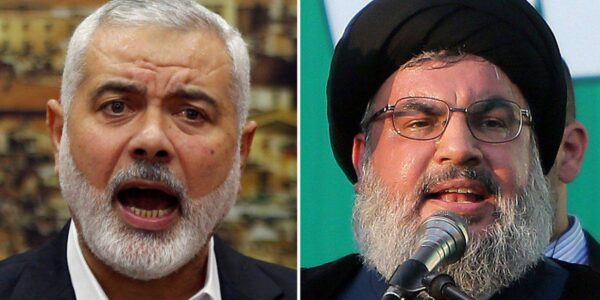
Hamas leader Ismail Haniyeh meets the Hezbollah chief Hassan Nasrallah in Beirut
Hamas political bureau chief Ismail Haniyeh and Hezbollah leader Hassan Nasrallah met in Beirut on Tuesday, as the Gaza-based terror chief held a series of high-level meetings around the Arab world.
The two were said to discuss the recent 11-day bout of fighting between Israel and Gaza-based terror groups led by Hamas, and how they could build on the experience of the latest round of violence.
“Nasrallah and Haniyeh affirmed the depth of the relationship between Hezbollah and Hamas, and its primary position in the axis of resistance,” according to the pro-Hezbollah Lebanese TV station al-Mayadeen.
There were no public statements by the two after the meeting.
The political head of the Gaza terror group visited Morocco and Mauritania before heading to Lebanon. Haniyeh last met with Nasrallah during his previous visit to Lebanon last September.
On Sunday, Haniyeh met with Lebanese President Michel Aoun, who is seen as broadly aligned with Hezbollah.
The fighting in the Strip, which erupted on May 10 after Hamas fired rockets at Jerusalem amid escalating Israeli-Palestinian tensions in the city, ended 11 days later with a ceasefire between Israel and the Gaza-ruling terror group.
During the fighting, Israel’s airstrikes on Hamas’s tunnels and bunkers was also said to be partially aimed at sending a message to Hezbollah in Lebanon, which maintains its own massive underground complex.
Yahya Sinwar, the leader of Hamas in Gaza, said last month Hamas coordinated with Hezbollah as well as Iran’s Revolutionary Guard Corps throughout the fighting.
Sinwar also said there was “full coordination between the resistance in Lebanon and resistance in Gaza,” referring to several rockets fired at Israel from Lebanon during the conflict.
The Israeli military blamed several of the rocket attacks from Lebanon on Palestinian factions in the country, not the Hezbollah terror group. However, it is unlikely that terrorists in southern Lebanon would be able to fire rockets without at least the tacit approval of the Iran-backed militia, which maintains a tight degree of control over southern Lebanon.
Source: TOI





